I tested 23 AI voice assistants in 2026 to see which ones actually understand you and which just sound smart. From Gemini to Alexa Plus and Rabbit R1, here’s what’s real and what’s hype in the world of voice AI.
The 23 best AI voice assistants in 2026: TL;DR
- Alexa: Great for home use
- Siri: Best for Apple users
- Otter AI: Best business voice assistant
- Bixby Voice: Best for Samsung users
- Gemini: A great free voice assistant
- Retell AI: Good for customized voice assistants
- Braina from Brainasoft: Great for multitasking
Special mentions
- Mycroft
- Speechify
- Rabbit R1
- Whisper AI by OpenAI
- Synthesys
- Deepgram AI
- Jasper Brand Voice
- Speechmatics
- Picovoice
- Voicemaker
- Dragon Professional v16
- ELSA Speak
- Resemble AI
- Uberduck
- Fireflies.ai
- ElevenLabs Reader
What is an AI voice assistant?
An AI voice assistant is a software program that uses artificial intelligence (AI), natural language processing (NLP), and speech recognition to understand and respond to voice commands.
These assistants perform tasks, answer questions, and control smart devices through spoken language, making interactions hands-free and intuitive. Popular examples include Amazon Alexa, Apple Siri, and Google Assistant.
Here’s how they handle your voice commands:
- Speech recognition: AI voice assistants use speech recognition to turn your spoken words into text. This involves analyzing the sound waves of your speech, breaking them down into phonemes, and predicting what was said using machine learning algorithms like the Hidden Markov Model.
- Natural language processing (NLP): Once your speech is transcribed, NLP helps the assistant interpret your request by understanding the structure and meaning behind the words. NLP focuses on intent recognition and extracting key information from your input.
- Machine learning and AI: These systems enable voice assistants to improve with each interaction. By learning from past interactions, they get better at recognizing patterns, understanding accents, and handling more complex requests.
By combining these technologies, AI voice assistants can accelerate your business operations, freeing up your time.
1. Alexa: Great for home use

Score: 10/10
I own an Echo Third Gen speaker, and one of the first things I’ve noticed is that Alexa keeps evolving to meet several needs. This makes Alexa one of the most versatile AI voice assistants I’ve used.
Alexa also helps me manage a few of my home devices. Whenever I return home from work, I tell Alexa to turn on the lights in my living room. And instead of getting up from my couch and manually adjusting my thermostat, I just ask Alexa to adjust it to 68° — without pausing the latest episode of Black Mirror.
And I’ve used Alexa to set up a voice profile, so it only listens to my voice. After I implemented this feature, my buddy Harold was no longer able to command Alexa to switch the music from Thelonious Monk to Pantera during dinner parties.
Features
- Alexa is a responsive voice-activated agent — she plays my music, audiobooks, and podcasts from Amazon Music and Spotify with just a simple command.
- She can control your smart home like a boss, integrating with many different platforms, tools, and devices. For instance, I use Alexa to turn off the lights in my apartment.
- It helps you shop on Amazon, which is dangerously convenient but perfect for lazy days when you don’t care about getting your steps in.
- Offers fun skills, from guided meditations to silly games and interactive stories for kids. I’m personally a fan of the productivity hacks, which have helped me focus more time on my day-to-day content tasks.
What’s new
Amazon has announced Alexa Plus, a new AI assistant designed to be smarter and more conversational, allowing for natural, back-and-forth speech and learning user routines. The launch includes new Echo devices (Dot Max, Studio, Show 8, 11) featuring custom AI processors and built-in smart home hubs (Zigbee, Matter) specifically built for Alexa Plus.
Ideal users
Amazon Alexa, particularly with its Alexa+ upgrades, is suited for those seeking a deeply integrated smart home experience. It's great if you regularly interact with a variety of connected devices — from smart thermostats to advanced security systems like Ring.
Pricing
Alexa+ costs $19.99/month, but is free for all Prime members.
Verdict
Alexa's greatest strength lies in its extensive integration capabilities and adaptive, user-centric approach to automation. However, Alexa’s boatloads of functionalities and features, especially those with Alexa+, have a steep learning curve — there are still a few functions that I’m continuing to wrap my brain around.
2. Siri: Best for Apple users

Score: 9.5/10
Siri is one of the first AI assistants, and it’s an exclusive platform for iOS users like me. If you're firmly entrenched in the Apple ecosystem, she's your go-to for getting things done. As someone who enjoys my iPhone and Apple Watch, I’ve found Siri to be the perfect hands-free assistant.
Whenever I’m out on a run, Siri helps track my pace, heart rate, and distance. I simply ask Siri for these metrics, and she responds moments later. This is very helpful for VO2 max training when I need to maintain a high heart rate.
Siri also saves me the time it takes to open my phone, fumble around to Maps, and type in "nearest café" when I need a jolt of caffeine.
I simply ask Siri for the nearest café, and she immediately shows me options with distances and ratings. One tap and I'm navigating there.
Features
- Provides you with the latest news with a healthy dose of attitude, sports scores, and weather updates. Plus, you can set personalized news updates, which Siri can deliver to you daily. For instance, Siri provides me with a daily update on news related to my stocks.
- Plays your favorite tunes and podcasts from Apple Music — you can even set different podcasts and playlists to start at specified times.
- Integrates with your Apple-friendly smart home devices. Whenever I’m away from my iPhone, I can speak to Siri “remotely” via my Apple Watch.
What’s new
Apple recently introduced upgrades to Siri through its Apple Intelligence initiative, bringing more natural voice interactions, improved contextual understanding, and personalized voice features. These enhancements aim to make Siri more proactive across iPhone, iPad, and macOS, with rollouts continuing through 2026.
Ideal users
Apple’s Siri is ideal for users fully invested in the Apple ecosystem who want hands-free control across iPhone, Apple Watch, HomePod, and Mac. It suits anyone who values smooth device syncing and dependable voice commands for daily tasks, reminders, and smart home routines.
Pricing
Siri comes free with your iPhone, iPad, or other Apple gear — no extra charge for the occasional side-eye.
Verdict
Siri is excellent for integrating with the iOS ecosystem; however, it’s less effective outside the Apple ecosystem. Yet, if you’re concerned about privacy, consider Siri and the Apple ecosystem: Processing stays on-device when possible, and Apple doesn’t monetize personal data.
3. Otter AI: The best business voice assistant
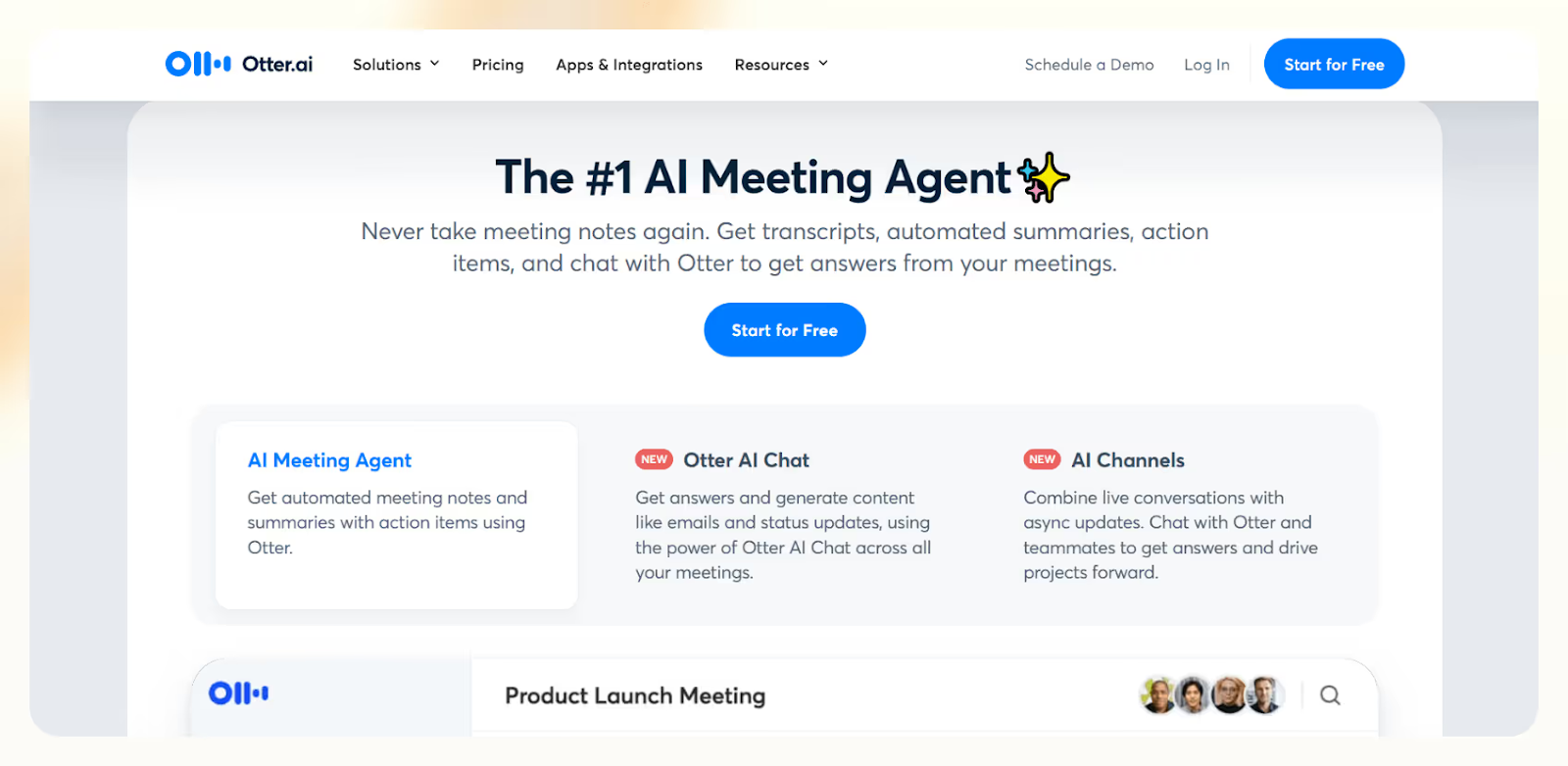
Score: 9.5/10
I tried Otter.ai for a few meetings and brainstorming sessions, and it provided accurate transcription notes. It boasts an intuitive interface, allowing me to replay audio while reading the transcript, edit any errors, and share notes with my team.
Before meetings, I scheduled the Otter Assistant to auto-join my Google Meet call.
When the meeting started, Otter began capturing every speaker and converting their audio into text in real-time, which I could see in the text box on the app.
After the meeting, I distilled the notes into easy-to-read bullet points by hitting the “Generate Summary” button. It also produced actionable items, like finishing our proposal by Friday. Then, I saved the file as a PDF and sent a copy to my team’s Slack channel.
Features
- Otter’s AI Meeting Agent automatically joins Zoom, Google Meet, or Microsoft Teams calls, transcribes everything as it happens, and generates concise summaries and action items. This helped me better understand others’ points of view.
- The platform features a speaker identification functionality, which can distinguish between voices and label them, making it great for multi-person meetings.
What’s new
Otter AI recently expanded its transcription engine with better accuracy, multilingual support, and smarter meeting insights. These updates help users capture conversations more reliably, generate clearer summaries, and access real-time collaboration tools designed for modern teams, classrooms, and remote work environments.
Ideal users
Otter.ai is ideal for individuals and teams who have frequent meetings and need to capture every detail without distraction. It’s also a fantastic tool for educators, students, and researchers — anyone who needs to transcribe lectures, interviews, or group discussions.
Pricing
Otter.ai comes with a free version lets you transcribe meetings and lectures in languages like English, French, and Spanish. The Pro Plan, at $16.99/month, lets you transcribe up to 1,200 minutes of voice entries.
Verdict
Otter.ai works well for tasks like note-taking, generating actionable summaries, and sharing post-meeting notes. However, despite the updates, I found that transcription accuracy dropped when people with heavy accents spoke or when there was background noise.
4. Bixby Voice: Best for Samsung users
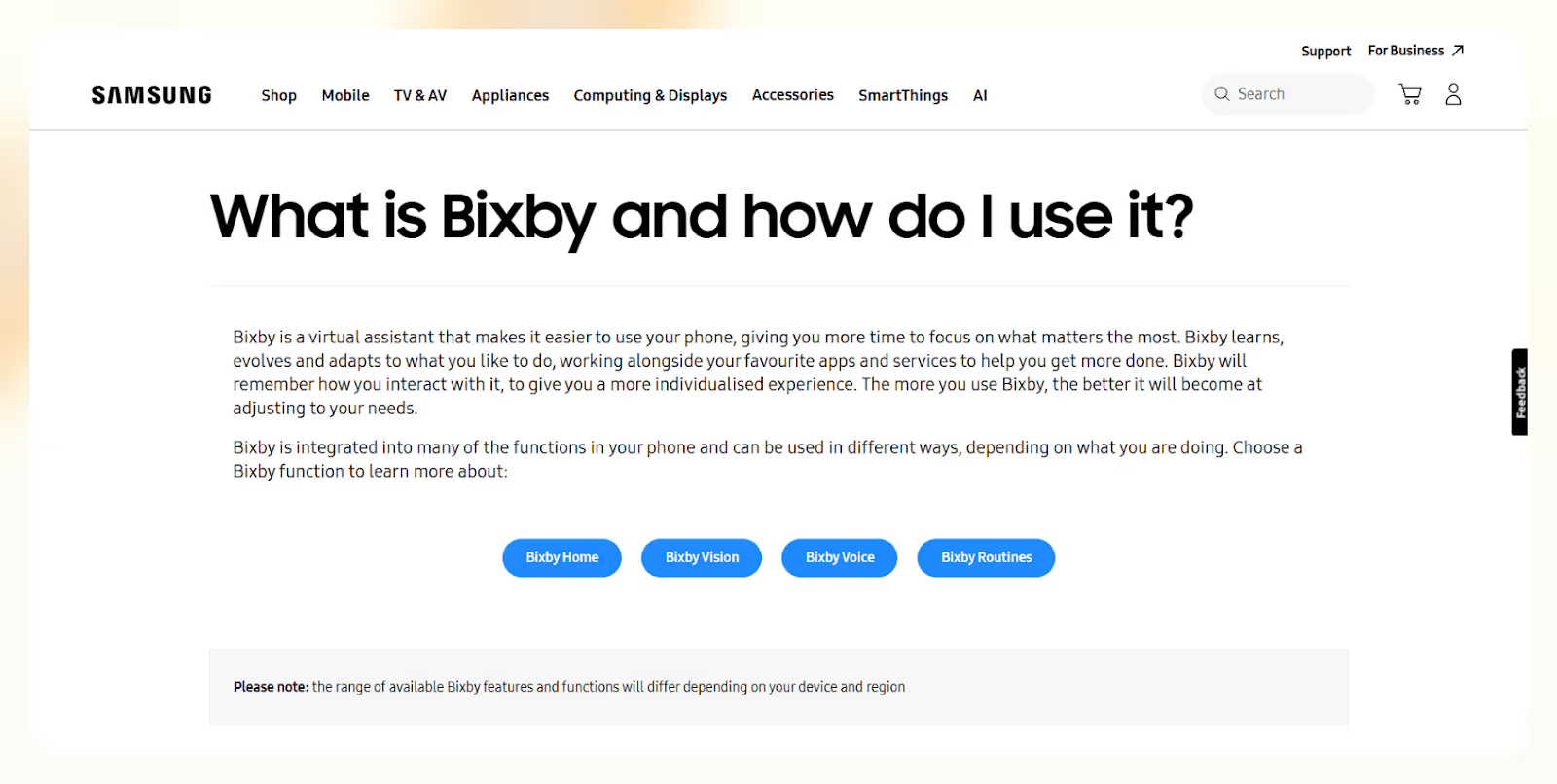
Score: 9/10
Since I own a Galaxy TV, I’ve been able to get a lot out of Bixby, Samsung’s built-in virtual assistant. It uses vision and context to help out, and I’ve noticed it learns my habits and adjusts to my preferences.
Every Saturday in the fall, I wake up and tell Bixby to show me the first college football game of the day. Whenever a commercial break starts, I tell her to switch to the next game I’m following. The bottom line: There’s no fumbling through channels or flipping through menus — I just say the command, and I’m watching the next play, not some fast-food commercial.
Features
- Bixby Voice enables hands-free device control, allowing you to send messages, get answers to questions, set reminders, and adjust settings simply by speaking. You can activate it by pressing the Bixby or side key or saying, “Hi Bixby.”
- It supports quick commands, which let you customize and bundle multiple actions under a single phrase. For instance, when you say “Good night,” Bixby can mute notifications, enable night mode, set your alarm for the next day, and change lock screen shortcuts.
What’s new
Samsung recently enhanced Bixby Voice with improved natural language recognition, faster responses, and deeper integration across Galaxy phones, wearables, and smart TVs. These updates make Bixby more reliable for controlling apps, media, and smart home devices through simple, conversational commands.
Ideal Users
Bixby is ideal for Samsung Galaxy users who want a deeply integrated assistant to simplify daily tasks, automate routines, and control their devices. Although I only use a Samsung TV, it would be great if you use multiple Samsung devices, as Bixby facilitates smooth interaction across phones, tablets, wearables, and connected appliances like your washer, dryer, or refrigerator.
Pricing
Bixby is included at no additional cost on compatible Samsung devices, with no subscription fee or separate charges.
Verdict
Bixby stands out for its integrations with Samsung devices and ability to learn and adapt to user preferences, offering a personalized and assistant experience. However, Bixby’s usefulness is limited to the Samsung ecosystem only.
5. Gemini: A great free voice assistant
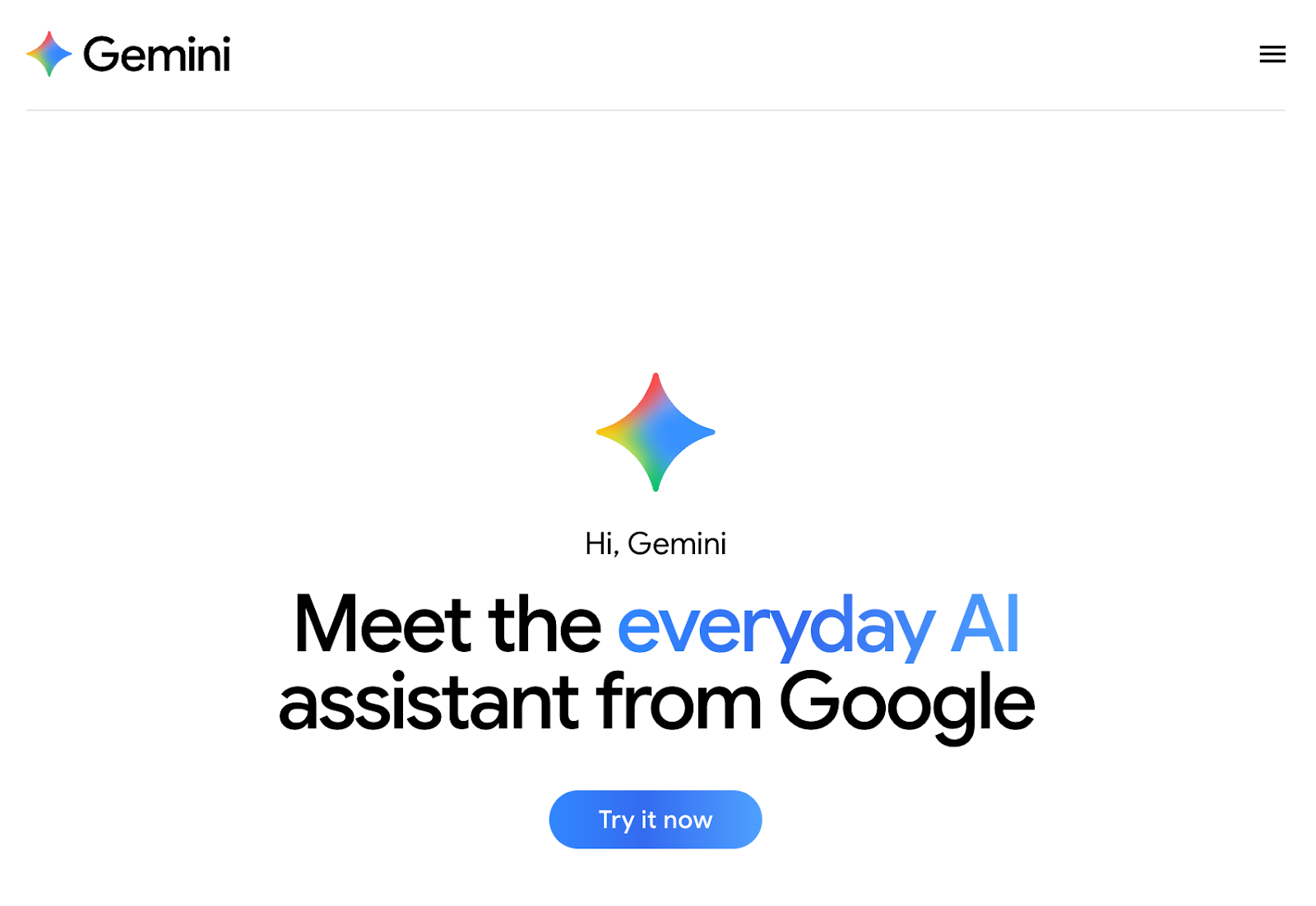
Score: 8.5/10
Gemini replaced Google Assistant across Google’s ecosystem in 2025, and when I tested it, I was impressed with its conversational abilities and how it integrates across my devices. Unlike older voice assistants, Gemini can handle complex, multi-step requests while understanding natural language the way I actually speak.
I tapped into Gemini on my iPhone to manage my calendar. It accessed both my work and personal calendars, letting me manage everything in one place.
When my client pushed a meeting back to Friday, I simply told Gemini to make the change. Gemini updated the schedule across my devices without me opening a single app.
One standout feature is Gemini Live, a new voice mode that lets you talk naturally, interrupt mid-sentence, change topics, and ask follow-up questions anytime. It feels like a real conversation, making complex tasks much simpler.
Features
- Point your phone's camera at something and ask Gemini for help — storage ideas, outfit suggestions, or fixing appliances. You can also share your screen to get instant help with what you're looking at.
- Gemini connects your Gmail, Google Keep, Calendar, and Drive. Ask it to grab ingredients from a YouTube recipe and add them to your Keep shopping list, or draft a bio using your resume from Drive.
- Set repeating alarms, adjust your smart lights, turn on the TV for movie time, or control your phone with voice commands like "Take a selfie.
What’s new
Google recently updated Gemini with deeper Workspace integration, improved mapping and navigation capabilities, and new functionality on the Pixel Watch. These upgrades give users more natural interaction across Gmail, Calendar, Docs, and Maps, making Gemini more helpful in daily planning and productivity.
Ideal users
Gemini is suited for Android users who want an AI assistant that goes beyond simple commands. Its ability to integrate across Google services makes it valuable if you rely on Gmail, Drive, Calendar, and Keep. The natural conversation style also works well for people who want to brainstorm, learn, or get personalized help with complex tasks.
Pricing
Gemini is free to use on Android devices and available as an app for iPhone users. For those who don't want to pay for an AI assistant, Gemini is a solid choice.
Verdict
Gemini's strength lies in its natural language understanding and deep integration with Google's ecosystem. It handled complex, multi-part requests better than older voice assistants. That said, privacy remains a consideration, since it processes personal data to deliver personalized experiences.
6. Retell AI: Good for customized voice assistants
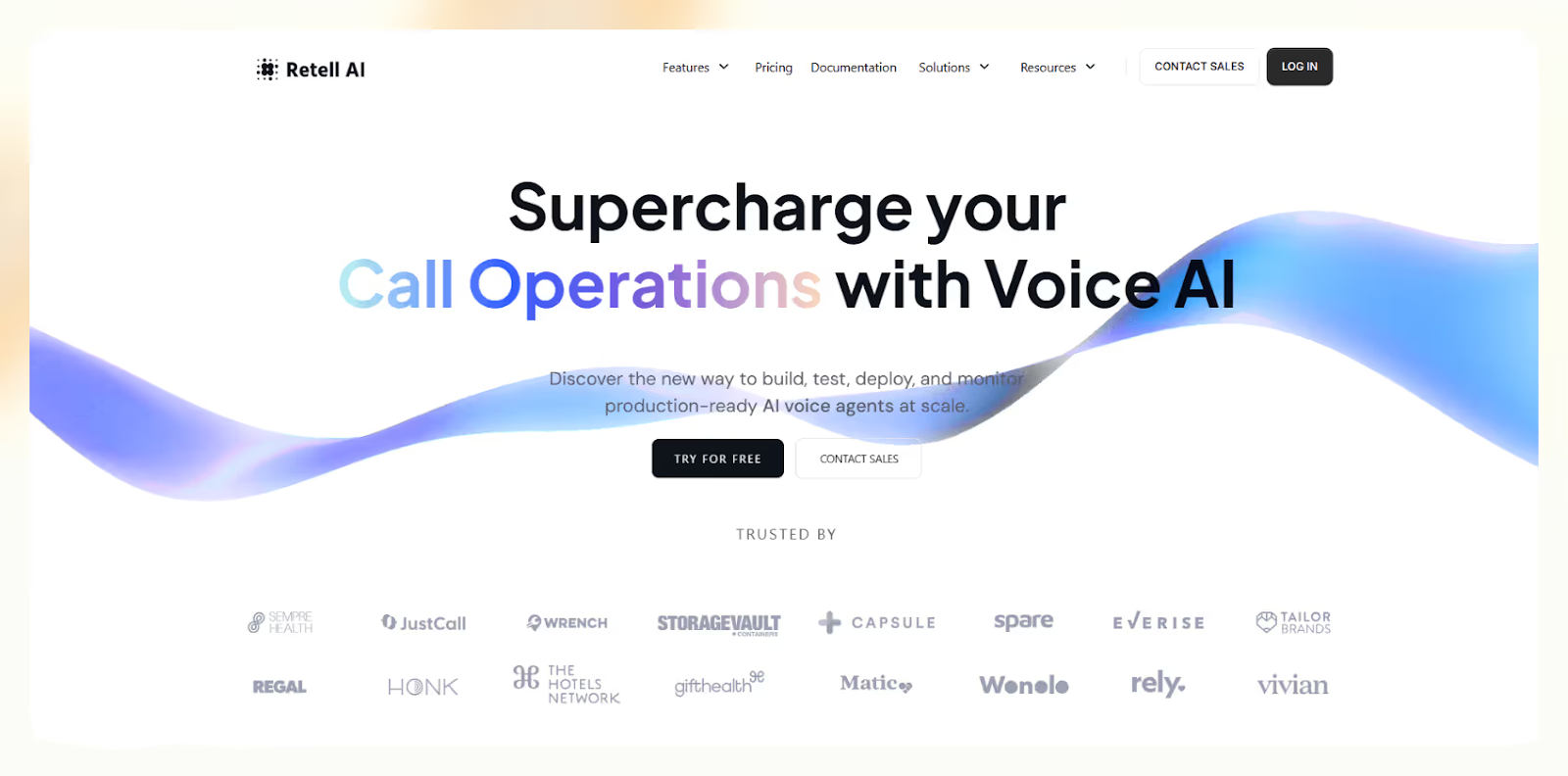
Score: 8/10
I tried the Retell AI free version, which let me build a custom AI assistant tailored to exactly what I want. It’s a DIY approach, which gave me a lot of flexibility. Talking to Retell was natural, making the whole experience feel more intuitive and personal.
Using Retell AI’s visual agent builder, I crafted a custom personal assistant. Then, I commanded it to import our company’s internal documentation and set up an Auto-Sync Knowledge Base.
This way, the agent would learn new company info immediately, so it could always pull the latest answers without needing manual updates.
My Retell assistant was programmed to answer general questions that a newly onboarded employee might have. It could answer anything from how to approach a client in the finance industry to billing procedures and how to request time off.
Features
- You can design your assistant's personality and voice and then determine what tasks it can perform.
- Integrate with your existing smart devices and services, but you’ll need some coding know-how to do this.
- Businesses prioritizing data security and compliance, especially in sectors like healthcare, will appreciate Retell AI's HIPAA compliance.
What’s new
Retell AI recently introduced stronger multilingual support, improved API tools, and more lifelike voice options for building custom phone agents. These updates help businesses create smoother customer interactions, automate repetitive calls, and deliver more natural, context-aware responses during scheduling or support conversations.
Ideal users
Retell AI is designed for businesses seeking to bolster call operations through AI-driven voice agents. If you aim to automate tasks such as appointment scheduling, lead qualification, customer support, and reception services, the platform is ideal.
Pricing
Retell AI has a free tier to get started and a pay-as-you-go model. You can even add special features, like a connection with OpenAI Voices and telephony.
Verdict
Retell AI offers a suite of features that streamline voice operations and can handle concurrent calls, which is great for customer engagement. However, connecting with other third-party platforms was difficult for me, so you’ll probably need some development skills for deep integration.
7. Braina from Brainsoft: Great for multitasking

Score: 7.5/10
I used Braina (short for Brain Artificial) for voice commands and general productivity tasks, like transcribing to-do lists. It was also useful for touchless web searches and transcribing text messages and emails.
By speaking naturally into my phone, Braina’s Voice Typing features helped me write to-do lists and draft emails, all without laying a finger on my cumbersome screen keyboard. I was impressed by how it handled transcribing long grocery lists and lengthy emails with impressive accuracy.
Another perk I really enjoyed about Braina: It can dictate text in over 100 languages, making it a versatile tool — it helped write out my spoken sentences in Mandarin so I could study the characters.
Features
- Braina executes tasks on your PC using voice commands, like launching apps, opening websites, and performing searches.
- Controls smart devices and manages your smart home setup with ease.
- It helps with calculations, search queries, and scheduling tasks, making it perfect for both personal and professional use.
What’s new
Braina recently expanded its speech recognition engine to support over one hundred languages, added stronger technical vocabulary handling, and improved PC control features. These updates make Braina more capable for dictation, system navigation, and executing custom voice commands across Windows applications.
Ideal users
Braina is ideal for professionals who need accurate voice dictation for long documents, especially in fields like law, research, and medicine. It suits users who want hands-free computer control, multilingual transcription, and customizable voice commands to streamline daily typing or administrative work.
Pricing
Braina has a free version, but to unlock its full feature set, the Pro version starts at $99/year, which includes better voice recognition and PC control features.
Verdict
Braina is ideal for users who want accurate dictation and hands-free PC control across Windows apps. It’s especially useful for professionals handling long documents or technical writing, offering strong multilingual support and customizable commands for improving daily productivity and workflow efficiency.
{{templates}}
Special-mention AI voice assistants of 2026
The following voice AI assistants didn’t quite beat the top 7. But these are all worth a look, so I reviewed each one anyway.
8. Mycroft
Mycroft is an open-source voice assistant built for users who prioritize privacy and customization. I tested it by integrating community-built skills from the Mycroft marketplace to fetch stock reports and control smart home devices. The platform runs locally on your hardware, meaning your voice data stays on your device rather than being sent to corporate servers.
Mycroft feels rough around the edges compared to polished assistants like Alexa or Google. You'll need Python knowledge to customize features and build your own skills. It's not beginner-friendly, but if you value privacy and want full control over your voice assistant, Mycroft delivers.
9. Speechify
Speechify’s strengths lie in its premium feature set: over 200 natural, human-sounding voices across more than 60 languages, plus the ability to listen at speeds up to 5 times faster. On the flip side, Speechify’s free tier feels very limited: you only get 10 basic voices, 1x listening speed, and no offline access.
10. Rabbit R1
I borrowed a Rabbit R1 from one of my colleagues. I tested its compact, pocket-friendly design and push-to-talk button. The Rabbit OS activates instantly, handling tasks like booking rides, translations, and recipe suggestions. It also uses a rotating camera, allowing the AI to identify objects and items.
If you’re into gadgets, you might want to shortlist the Rabbit R1, but most will probably be better served by going with a SaaS-based AI voice assistant that you can download directly to your phone.
11. Whisper AI by OpenAI
Whisper is an automatic speech recognition (ASR) system developed by OpenAI, the makers of ChatGPT. I was impressed with its ability to understand accents and technical language while filtering out background noise.
Yet, Whisper doesn’t match the peak accuracy of commercial assistants like Alexa or Siri for real-time voice commands. The requirement to process audio in 30‑second chunks can also disrupt context for more extended conversations or recordings, which can be a problem if you’re aiming for continuous transcription workflows.
12. Synthesys
I used Synthesys to generate AI voiceovers for marketing videos with virtual human avatars. It was easy to choose a lifelike avatar, type out a script, and then create a video with synced lip movements and natural speech.
On the downside, the customization options for their tone, gestures, and pacing were limited.
And if you’re looking for deeper control over emotional delivery or more expressive performances, Synthesys might feel a bit rigid compared to some other tools.
13. Deepgram
Deepgram is best suited for transcribing recorded interviews. I was particularly impressed by its speed and accuracy. But there's a learning curve if you're not comfortable working with API endpoints and JSON responses. For basic users or solo creators, tools with built-in interfaces like Otter.ai or Descript might feel more accessible out of the box.
14. Jasper Brand Voice
When I needed to automate customer interactions on my website, Jasper's voice agent delivered surprisingly natural, on-brand conversations. By uploading tone-of-voice guides, the platform adapted to my company's style, answering FAQs, qualifying leads, and suggesting products without sounding robotic.
Here's the catch: Jasper isn't plug-and-play like some competitors. Getting the best results requires fine-tuning your brand voice, which means you'll need familiarity with prompt engineering and customer journey mapping. If those concepts sound foreign, expect a steep learning curve.
15. Speechmatics
Speechmatics offers a flexible speech-to-text API that integrates into various services, solutions, and applications. Using some of my tech know-how, I connected my Speechmatics account to Notion and Zapier. This allowed for automatic meeting transcription and notes organization.
But if you’re unfamiliar with APIs and how they work, you’ll struggle with Speechmatics, as it’s a platform geared toward tech enthusiasts.
16. Picovoice
With Picovoice, I built and embedded a custom voice command system into a native mobile app my friend made. It ran locally on the device, which meant zero latency and full offline functionality, reminding me of the smoothness and control of on-prem software.
As you might expect, getting everything up and running wasn’t beginner-friendly. If you’re not comfortable with Python, JavaScript, or mobile frameworks like React Native, this platform is out of reach.
17. Voicemaker
I used Voicemaker to convert a few written articles into audio format, and I was impressed by the clarity and customization it offered. I could tweak voice speed, pitch, emphasis, and pauses using SSML tags to make the narration sound more natural.
The main downside is the bare-bones user interface. It gets the job done, but doesn’t feel modern or polished. And the voices lack some of the advanced emotional range and realism that premium tools offer.
18. Dragon Professional v16
Dragon's voice recognition blew me away with its accuracy, even when I threw long, complex sentences at it. The built-in commands like "select previous paragraph" or "insert bullet list" let me shuffle between apps and edit text without touching my keyboard, which dramatically sped up my workflow.
Microsoft acquired Dragon in 2021, strengthening its enterprise integrations. But guess what? There's a learning curve. Setting up custom commands and managing vocabulary lists requires patience, so it's not the friendliest option if you're not tech-savvy.
19. ELSA Speak
ELSA Speak targets non-native English speakers with AI-powered pronunciation coaching and real-time feedback. Even though I'm a fluent speaker, I decided to test its impact on the ESL industry by diving into an interactive role-play scenario, ordering barbecue at a Texas restaurant.
The conversation worked well for vocabulary building. I discussed different cuts of steak and menu items without issue. But the feedback felt mechanical at times, and the AI stayed rigidly within the restaurant scenario. When I asked the server's opinion on whether the University of Texas Longhorns could win the SEC, it just told me their lean brisket is cut from Longhorns. Maybe that's a sign.
20. Resemble AI
Creating a voice clone for a podcast character sounded ambitious, but Resemble delivered surprisingly lifelike results. The emotional tone slider let me dial in feelings like joy or sadness with a simple button adjustment. Thanks to the developers for not adding complex menus.
The catch? The interface clearly caters to developers over casual users, especially when connecting with external apps via API. If you're comfortable with code, Resemble is powerful. If not, you'll hit roadblocks quickly.
21. Uberduck
Uberduck turns text into musical vocals and rap, which is exactly as fun as it sounds. For a marketing campaign on Instagram, I generated a few AI hip-hop verses, and the rap generator handled rhythm and rhyming flows surprisingly well, even syncing perfectly to beats I uploaded.
The reality check? Uberduck isn't always polished. Outside the rap feature, many voices sound exaggerated or flat-out robotic. The voice library is substantial, but quality varies wildly.
22. Fireflies.ai
After connecting Fireflies to my Zoom account, it started transcribing and summarizing client meetings automatically. Within minutes of each call ending, I had clean transcripts with action items, keyword highlights, and sentiment analysis.
The transcription stumbled in group discussions with cross-talk or heavy accents. Names got mismatched, action items weren't always tagged correctly, and I found myself manually editing more than I'd like. It's less beginner-friendly than other voice-AI note-takers, but it still saves considerable time.
23. ElevenLabs Reader
At last, I picked ElevenLabs Reader because it does a solid job converting research articles into audio. It handles PDFs, ePubs, and web articles using remarkably natural AI voices. Unlike robotic text-to-speech tools, these voices have genuine emotion and intonation. I could choose from dozens of voices across languages or even clone my own.
The app syncs across devices, so I started listening on my phone and continued on my laptop. The free tier gives you limited monthly characters before hitting the paywall, which adds up quickly for heavy users.
{{cta}}
How I chose the best AI voice assistants
First, I found loads of different AI voice assistant platforms, and boiled down my shortlist to 23 by actually testing them against these standards:
- Accuracy and responsiveness: I assessed how well each assistant understood commands and how quickly they delivered results. Top performers like Alexa and Siri excelled here, understanding natural language and responding instantly.
- Integration and compatibility: I examined how assistants worked across different devices and operating systems. Gemini stood out for its ability to orchestrate tasks across Gmail, Calendar, and Drive, while Bixby impressed with Samsung device integration.
- Customization and AI learning: I looked for systems that let you customize voice options, language settings, and personalized workflows. Retell AI shone here, allowing you to design your assistant's personality from scratch.
- Privacy and security: I evaluated how each platform complied with privacy regulations, encrypted user data, and protected against cyber threats. Mycroft's open-source, locally-run approach scored highest for privacy-conscious users.
After testing, I scored each platform from 1 to 10. Tools earning under 7.5 points landed in the "Special Mention" category.
What’s new and evolving in the world of AI voice assistants
AI voice assistants are changing fast. Here are the key trends reshaping how these tools work:
- Hyper-personalization: Voice assistants now adapt to your speaking style, preferences, and context. Gemini Live, for example, lets you interrupt mid-sentence and change topics naturally, adjusting to how you actually think and communicate.
- On-device intelligence: More processing happens directly on your device rather than in the cloud. Siri and Mycroft lead here, improving speed, privacy, and offline functionality. You get faster responses without sending every command to a server.
- Proactive problem solving: Voice assistants are moving beyond reacting to commands. They anticipate your needs and offer solutions before you ask. Lindy can automatically update your CRM after a meeting and draft follow-up emails without prompting.
- Autonomous task completion: These tools now handle complex, multi-step workflows from start to finish. Gemini can grab ingredients from a YouTube recipe, add them to your Google Keep shopping list, and set a reminder to buy them, all from one voice command.
- Emotional intelligence: Newer models detect emotions in speech and adjust their tone accordingly. ELSA Speak uses this for language learning, while Resemble AI lets you dial in emotional tones like joy or sadness for voice clones.
- Enterprise integration: Voice assistants are being embedded into business software. Otter AI integrates with Zoom and Slack for automated meeting notes, while Jasper connects with customer service platforms to handle support queries.
These trends show where voice AI is headed. The tools are getting smarter, more natural, and capable of handling tasks that once required human intervention.
Try Lindy: Your AI assistant that actually gets work done for you
If testing 23 different voice assistants showed me anything, it’s that the best AI tools don’t just listen, they take action. That’s exactly what Lindy does.
Lindy handles emails, meetings, follow-ups, summaries, sales outreach, and day-to-day operations without any coding or setup headaches.
Here’s what makes Lindy stand out:
- Natural, conversational intelligence: Ask in plain language, and Lindy handles tasks instantly, not just answers questions.
- Automations that run themselves: Build workflows or full AI agents for support, outreach, scheduling, and internal ops. Plus, you can get started with pre-made templates.
- Integrates with your stack: Connect Lindy to tools like Google Workspace, Stripe, Intercom, and more with a few clicks.
- Scales with you: Start free with 40 tasks and 400 credits, then upgrade when you’re ready for higher-volume automation.
Try Lindy for free and automate your first 40 tasks today.




















.png)
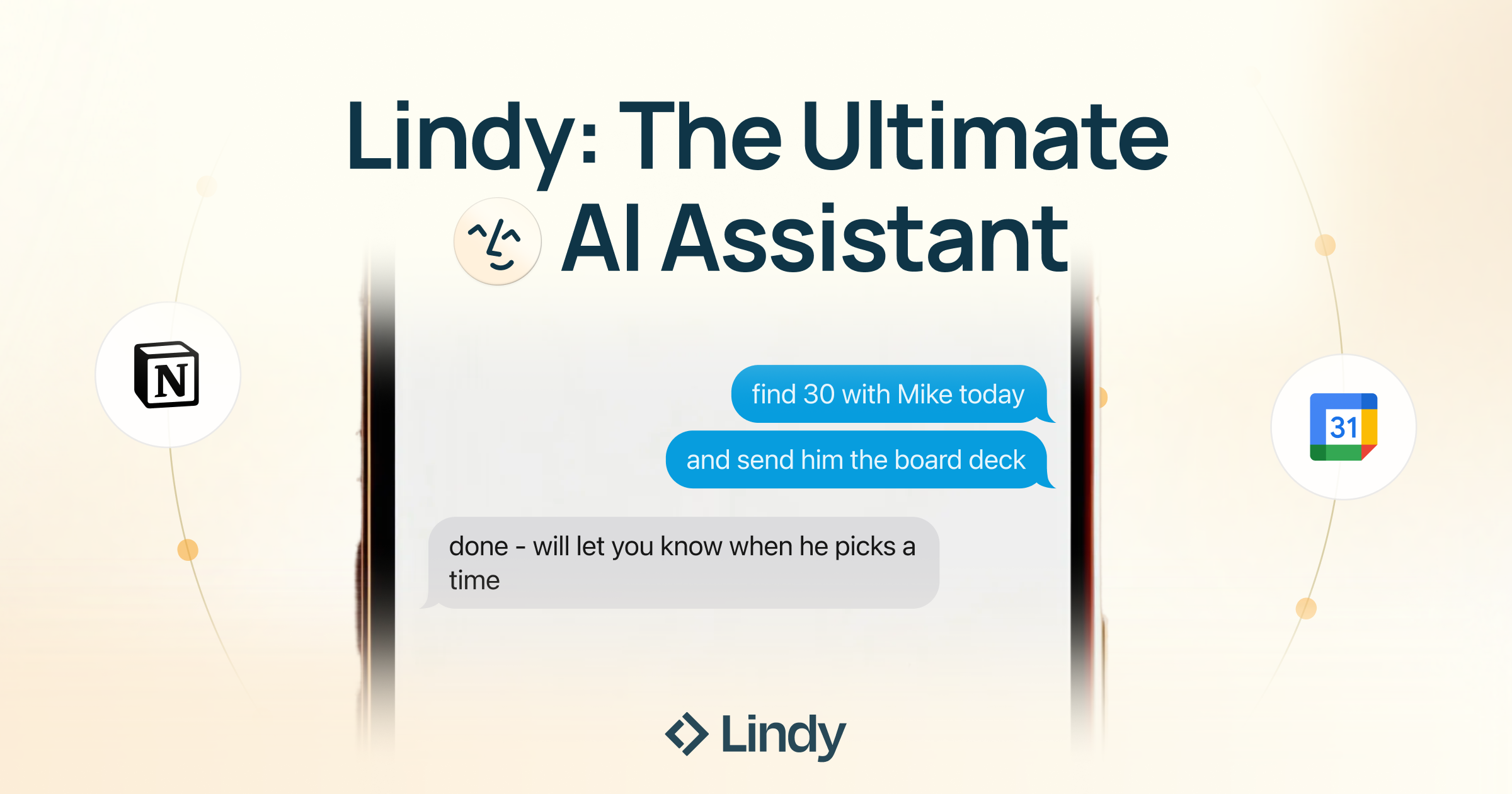
%2520(1).png)
.png)
%20(1).png)


.png)